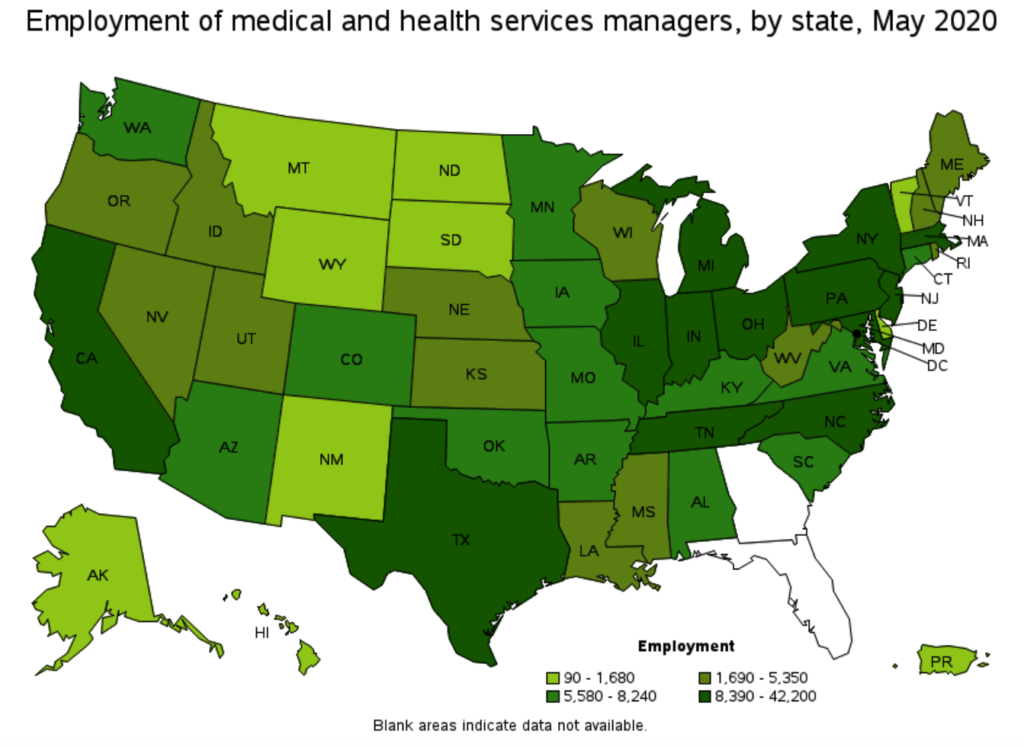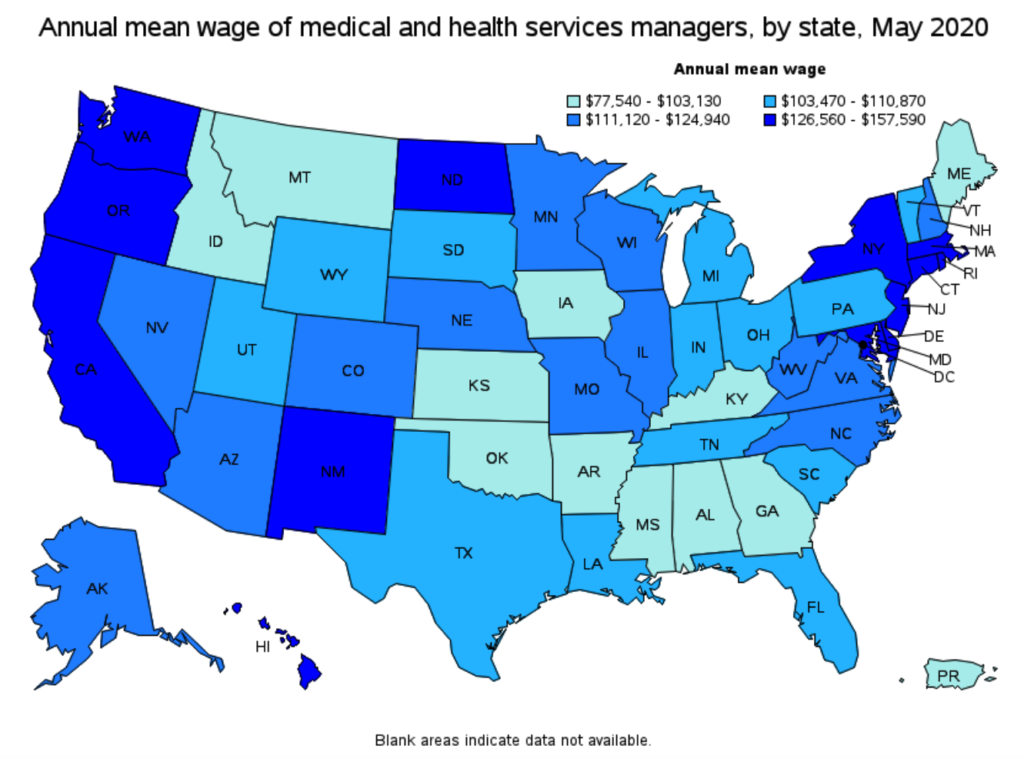According to the U.S. Bureau of Labor Statistics (BLS), the median healthcare administrator salary is $104,280 per year and employment of medical and health services managers is projected to grow 32 percent from 2019 to 2029, much faster than the average for all occupations.
While changes in healthcare systems paired with increased demand for medical services are reasons for employment growth, technological advances in information governance and regulatory shifts in health law and policy are also factors driving growth. Healthcare administrators play a vital role in their healthcare organization, which may be a large hospital system, private clinic, nursing home or assisted living facility, ensuring it is operating effectively and profitably. Employers need skilled professionals with specialized knowledge to successfully navigate the often complex world of healthcare.
Because healthcare is a diverse field that spans a variety of workplace settings, a healthcare administration salary depends on several factors, including the workplace, size of the organization, job title, region, education level, and experience. Additional factors, such as benefits, profit sharing, retirement, and bonuses, can also impact total compensation.
Workplace
A wide range of healthcare administration job opportunities exist in nearly every healthcare setting—hospitals, physician’s offices, surgical centers, assisted living and skilled nursing facilities, insurance companies, veterans affairs systems, pharmaceutical companies, and medical supply vendors. The highest levels of employment can typically be found in general medical and surgical hospitals.
Size of healthcare organizations also vary and this can be a factor in salary. An executive administrator overseeing a large hospital or health system with many hospitals and outpatient care centers may earn a higher salary compared to an administrator of a smaller, non-profit community health clinic.
Hospital Administration
 A hospital may be the first workplace that comes to mind when thinking of opportunities in healthcare administration. According to the American Hospital Association, there are more than 6,000 hospitals across the U.S., including community hospitals in both urban centers and rural areas. Two-thirds of community hospitals are affiliated with a healthcare system.
A hospital may be the first workplace that comes to mind when thinking of opportunities in healthcare administration. According to the American Hospital Association, there are more than 6,000 hospitals across the U.S., including community hospitals in both urban centers and rural areas. Two-thirds of community hospitals are affiliated with a healthcare system.
The median hospital administrator salary is $87,845 per year (Payscale.com), however, actual salary will vary based on location, experience level, and employer. An experienced hospital administrator may earn the median healthcare administrator salary of $104,280 per year or higher.
Private Practice Administration
While the physician-owned private practice is giving way to larger practices affiliated with a hospital or health system, nearly half (49.1 percent) of patient care physicians worked in a private practice in 2020, according to a recent benchmark survey published by the American Medical Association. Advantages of a private practice include more autonomy in decision making compared to a large hospital or health system, a smaller workforce, and possibly a closer relationship with the patients served and the community in which the practice operates. Private practices can be found in both urban and rural areas.
Depending on the location and size of the practice, a practice administrator salary ranges from $51,000 to $113,000 per year, with a median salary at $74,807 per year (Payscale.com). An experienced administrator may earn an annual salary closer to the higher end of the range.
Assisted Living and Nursing Home Administration
According to the American Health Care Association/National Center for Assisted Living, there are 15,655 skilled nursing care centers in the U.S., serving 3.9 million people for short and long-term stays, and 28,900 assisted living communities in the U.S., providing residential services to those who need help with some activities of daily living (ADLs) but not around-the-clock care.
An aging population seeking different care models than previous generations combined with often complex regulatory oversight continues to drive demand for skilled professionals with knowledge of generational dynamics; ethical, legal and regulatory factors relevant to these types of healthcare organizations; strong financial, leadership, and management skills; and human resource strategies.
The median nursing home administrator salary is $92,904 per year (Payscale.com). A nursing home administrator with many years of experience may earn a salary at the top of the range at $129,00 per year. All states require licensure for nursing home administrators, and some states also require licensure for administrators in assisted-living facilities. The average salary for an assisted living administrator is $60,258 per year (Payscale.com).
RELATED: Graduate Certificate in Senior Living and Services Leadership
Job Title
The salary a healthcare administrator will earn varies by job title, which may indicate whether a position is entry level, mid career, or later. Jobs requiring years of experience, for example, senior leadership and CEO positions, typically earn a higher salary along with having greater accountability for the successful functioning of the organization. A healthcare administrator may oversee an entire health system or a specific department, or may specialize in a practice area, such as director of nursing, chief medical officer, etc.
Region
Job opportunities in healthcare administration exist across the U.S., however, location can be a major factor when determining salary.

States with the highest employment level in medical and health services managers:
- California
- Texas
- New York
- Massachusetts
- Pennsylvania
Typically, states with densely populated urban and suburban metropolitan areas will offer the highest concentration of employment opportunities and competitive salaries. However, some rural areas with a lower concentration of healthcare organizations and fewer employment opportunities offer salaries competitive with healthcare organizations in top-paying metropolitan areas.
For example, North Dakota has comparatively fewer medical and health services managers than states with the highest employment, but the annual mean wage ($126,560) is competitive with wages in metropolitan areas such as Los Angeles, Chicago, Dallas-Fort Worth, Philadelphia, and Miami-Fort Lauderdale. It’s important to remember, however, that even in states with lower annual mean wages, pay for healthcare administrators is generally favorable in comparison to the cost of living.

Top paying states for medical and health services managers:
- District of Columbia
- New York
- Hawaii
- California
- Massachusetts
Education
A quick scan of healthcare administrator job opportunities shows employers are looking for candidates with demonstrated skills and knowledge in healthcare administration acquired through a combination of education and work experience.
According to the BLS, medical and health services managers typically will have earned at least a bachelor’s degree, but employers increasingly prefer candidates who have earned a master’s degree, especially for executive roles that require greater understanding of the complexities of healthcare systems, communication skills, and strategic leadership. With a master’s degree in healthcare administration, employment opportunities increase along with lifetime salary potential.
Your Next Career Move—Healthcare Administration
In the 100% online UW Master of Science in Healthcare Administration you’ll learn strategic management skills through a curriculum that focuses on the specialized needs of healthcare. As a graduate, you’ll be qualified for leadership roles across a variety of healthcare settings, urban to rural. Enrollment advisers can help with all of your program questions. Call 1-877-895-3276 or email learn@uwex.edu.










